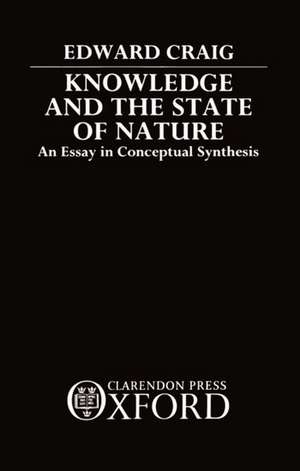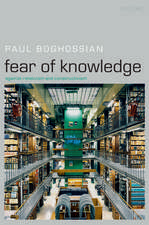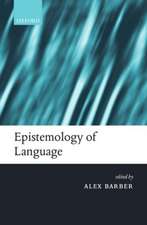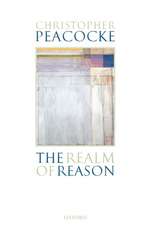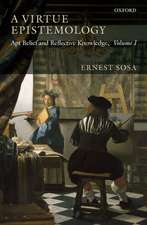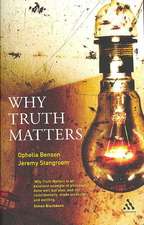Knowledge and the State of Nature: An Essay in Conceptual Synthesis
Autor Edward Craigen Limba Engleză Hardback – 3 ian 1991
| Toate formatele și edițiile | Preț | Express |
|---|---|---|
| Paperback (1) | 342.91 lei 31-37 zile | |
| OUP OXFORD – 28 ian 1999 | 342.91 lei 31-37 zile | |
| Hardback (1) | 352.71 lei 31-37 zile | |
| Clarendon Press – 3 ian 1991 | 352.71 lei 31-37 zile |
Preț: 352.71 lei
Preț vechi: 425.15 lei
-17% Nou
Puncte Express: 529
Preț estimativ în valută:
67.49€ • 70.65$ • 55.84£
67.49€ • 70.65$ • 55.84£
Carte tipărită la comandă
Livrare economică 26 martie-01 aprilie
Preluare comenzi: 021 569.72.76
Specificații
ISBN-13: 9780198242437
ISBN-10: 0198242433
Pagini: 182
Dimensiuni: 144 x 224 x 19 mm
Greutate: 0.37 kg
Editura: Clarendon Press
Colecția Clarendon Press
Locul publicării:Oxford, United Kingdom
ISBN-10: 0198242433
Pagini: 182
Dimensiuni: 144 x 224 x 19 mm
Greutate: 0.37 kg
Editura: Clarendon Press
Colecția Clarendon Press
Locul publicării:Oxford, United Kingdom
Cuprins
Nature and motivation of project. Doubts answered. Plato, Pears, Hobbes, comparison with state-of-nature theory in political philosophy. Evolutionary epistemology; Derivation of first condition; the problem whether belief necessary. Necessary and sufficient conditions an unsuitable format. The prototypical case; Need for third condition. Discussion of the Nozick - Dretske analysis; Why causal theory, tracking, reliabilism all good approximations. Why justified true belief a good approximation. Comparison with Grice; Distinction between informant and source of information; its nature and point. Application to putative 'knowledge without belief' cases; and to comparitivism: Goldman; Being right by accident. All analyses insufficient. Blackburn: the Mirv/Pirv principle; Local v. global reliabilism. Discussion of McGinn; Externalist and internalist analyses. The first-person case. Knowing that one knows; Insufficiency of the various analyses. The 'No false lemma' principle. Its rationale -- and its effect; Objectivisation. The 'cart before the horse' objection -- and the response; Lotteries and multiple premises: the pull towards certainty. Knowledge and natural laws; Objectivisation and scepticism. Unger's first account; Two explanations of scepticism: the first-person approach, and the absolute perspective; Knowledge and involvement. What makes truth valuable?; Testimony and the transmission of knowledge. Welbourne: believing the speaker; Other locutions: Knowing Fred. Information v. acquaintance. Interacting with Fred. Knowing London -- and German; Other locutions: Knowing how to. The inquirier and the apprentice. 'Knows how to' compared with 'can' and with 'knows that'; Appendix Unger's semantic relativism; References; Index
Recenzii
`In a study full of lively, subtle, clever ideas Edward Craig gives fresh impetus to a debate which until lately had seemed stalled'A.C. Grayling, Times Literary Supplement
'I greatly enjoyed this elegant little book. It is written with a light touch, unfailingly intelligent, fair and lively. It also has something interesting to say. Would that all epistemology could be like this!'Jonathan Dancy, Keele University, The Philosophical Quarterly, Vol. 42, No. 168
`far-ranging and strikingly original book ... I regard his approach as extremely promising. Craig has written one of the most inspired works of epistemology in several decades, a compact masterpiece sketching a new way to do epistemology and brimming with illuminating concrete proposals. The book is powerfully, densely argued, and it is exquisitely written. Any future work in epistemology must reckon with this unique book.'MIND
'much of what he has to say about familiar themes of analytic epistemology ... is interesting and frequently offers a new perspective on old problems'Matthias Steup, St. Cloud State University, The Philosophical Review, Vol. 101, No. 4, (October 1992)
'I greatly enjoyed this elegant little book. It is written with a light touch, unfailingly intelligent, fair and lively. It also has something interesting to say. Would that all epistemology could be like this!'Jonathan Dancy, Keele University, The Philosophical Quarterly, Vol. 42, No. 168
`far-ranging and strikingly original book ... I regard his approach as extremely promising. Craig has written one of the most inspired works of epistemology in several decades, a compact masterpiece sketching a new way to do epistemology and brimming with illuminating concrete proposals. The book is powerfully, densely argued, and it is exquisitely written. Any future work in epistemology must reckon with this unique book.'MIND
'much of what he has to say about familiar themes of analytic epistemology ... is interesting and frequently offers a new perspective on old problems'Matthias Steup, St. Cloud State University, The Philosophical Review, Vol. 101, No. 4, (October 1992)
